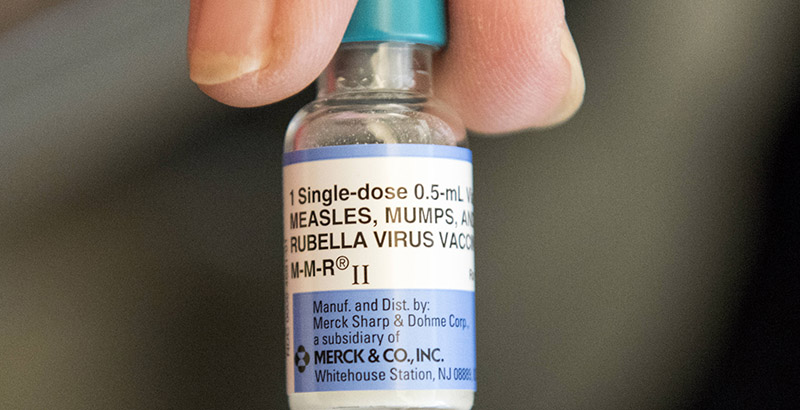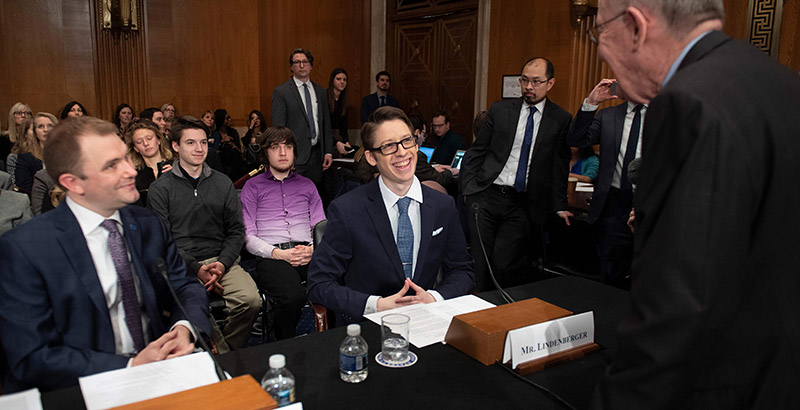Empowering Teens on Vaccines: New York Lawmakers Consider Bill That Would Allow Children 14 and Up to Be Vaccinated Without Parents’ Consent

New York could soon allow most teens to get vaccinated even if their parents don’t approve.
Assemblymember Patricia Fahy, a Democrat from Albany, and state Sen. Liz Krueger, a Democrat from Manhattan, introduced a bill this month that would allow minors ages 14 and older to request and receive the immunizations required by law without parental consent. If the bill passes, New York would join a handful of other states that allow some minors to get vaccines without parental permission.
The proposal comes amid outbreaks of measles in five states so far in 2019, including New York. Measles is extremely contagious — sometimes fatal — and is preventable with two doses of a safe vaccine, according to the Centers for Disease Control and Prevention. Current state law says that children under 18 need parents’ consent to receive vaccinations.
Measles was previously considered eradicated from the United States, but recent years have seen a resurgence of the disease in several states. In New York, there have been more than 300 cases in 2018 and 2019. No deaths have been reported during this current series of outbreaks, but hundreds of people died from measles every year in the United States before the vaccine was available, according to the CDC.
Brooklyn and Queens have had 158 confirmed cases of measles since October, the New York City Department of Health reported March 12. Most of the cases — 109 — occurred in the Williamsburg neighborhood of Brooklyn. The first confirmed case was an unvaccinated child who had traveled to Israel, which is experiencing an outbreak as well. Rockland County, which is northwest of New York City, reported 145 cases in 2018 and 2019.
Most of the cases in New York have occurred among the Orthodox Jewish community, where vaccination rates among children are lower than the 95 percent threshold needed to protect a community from measles.
Lawmakers introduced the bill March 8, a few days after Ethan Lindenberger, a teenager from Ohio, testified before the U.S. Senate Committee on Health, Education, Labor and Pensions about how he had defied his mother to get immunized. Lindenberger gained national attention after asking for information about vaccines in the online forum Reddit and ultimately deciding to get immunized as an 18-year-old despite his mother’s disapproval.
Fahy told ABC News the testimony drew her attention to the issue and that there could be an “uphill battle” to get the bill passed because of vaccine resistance in her state.

“We are on the cusp of a serious public health crisis, with long eradicated diseases now threatening at-risk populations such as very young children and immunocompromised individuals with conditions like leukemia,” Fahy said in a statement. “Minors unable to receive appropriate immunizations may encounter challenges in enrolling in high school and college, meaning that this is a choice that can have long-lasting impacts. When it comes to their health, teens should be allowed to make an informed choice in consultation with their health care provider.”
The proposal in New York would allow only immunizations that are required for school attendance, so it would not include non-mandatory vaccines like the flu shot.
There is no federal law requiring vaccinations, but all 50 states have legislation requiring certain immunizations for children to attend school. Most states allow religious exemptions and 17 allow “philosophical exemptions,” which can include personal beliefs. New York state law allows religious exemptions but not philosophical ones.
Lawmakers in New York are also considering a bill that would end all non-medical exemptions for vaccines.
Fifteen states allow some minors to receive vaccines without parental consent, though some require teens to be evaluated for maturity. New York’s bill does not include that.
The New York chapter of the American Academy of Pediatrics has publicly supported the proposed bill and stated in a memo that “young people are often more conscious about the misinformation on the internet and can in many cases disagree with parents who have bought into unfounded and dangerous anti-immunization diatribes and pseudo-science.”
The World Health Organization declared “vaccine hesitancy” one of the top 10 threats to global health in 2019. Misinformation about immunization — such as the disproven claim that the vaccine for measles, mumps, and rubella can cause autism — has thrived online and in some communities, including in Brooklyn.
In addition to preventing individuals from contracting a certain disease, vaccines help protect those who cannot be immunized because of other health concerns, said William Schaffner, an infectious disease specialist at Vanderbilt University Medical Center.
“If you don’t get vaccinated, you not only put your child at risk but other children in the community, particularly those who have an underlying illness or require a treatment that does not permit them to get vaccinated themselves,” he told The 74 last month. “And the way we protect those children is by having all the other children vaccinated so the measles virus can’t find them. We call that putting a cocoon of protection around those frail children.”
Get stories like these delivered straight to your inbox. Sign up for The 74 Newsletter

;)
